Rolande Falcinelli's Mausolée for Organ and Orchestra Premiered in the U.S.A.
Rolande Falcinelli was not particularly concerned with the social life and practical steps necessary to introduce one’s own music into concert halls. As a performer, she was deeply involved in the advocacy of Dupré’s music, and in the promotion of modern music in general (regularly performing Messiaen, Langlais, Duruflé, Guillou, Flor Peeters, etc.). But, while she played her own pieces for solo organ, she never performed her chamber music, except her Aphorisms for piano and organ (which she premiered as a pianist) and her Sine nomine for viola and piano (again as a pianist). All her other famous pieces for organ with other instruments were premiered by her disciples. And her first concerted work, Choral et variation sur le Kyrie Eleison de la messe « Orbis Factor » (1942), was premiered by Marie-Louise Girod, not by herself.
After composing her Mausolée, she did nothing to introduce this piece to any orchestra or conductor; she was weary with the aesthetic quarrels in the contemporary music world, and she was too independent from any of these “ways of thinking” to enter in the caste spirit which pervaded the 1970s. Now I am both gladdened and saddened to receive some moving messages from young and highly talented musicians who feel themselves on the same wavelength as her: they will never have the chance to meet her (and she never had the joy to exchange with them); but thanks to these new states of mind, her work will live, and her spiritual message is more of a topic today than it was during her life on earth.
So the Mausolée was waiting for its “apostle”... and the apostle came from America. I am deeply grateful to Timothy Tikker, who untiringly assumed all the efforts to make this première possible (as he tells below), to perform himself a demanding work (the great virtuoso Rolande Falcinelli was writing for her own stamina!), and to do alone the enormous and tedious job of engraving the full score, individual orchestral parts and the soloist’s part!
I can say without any doubt than nobody knows the Mausolée better than Timothy Tikker! He knows every note, every sign, and - more important than any material consideration - his enthusiastic involvement was a constant support for each of us over these last years.
Now I will let you read the pages he wrote after the première to be published on our website, and I note once more how “no prophet is without honour save in his own country,” and that American performers always bring an essential contribution to French music.
Sylviane Falcinelli
I learned of the existence of Mausolée from the list of Rolande Falcinelli’s compositions given in L’Orgue: Cahiers et Mémoires, no. 26 (1981: II): “Rolande Falcinelli et la classe d’orgue du Conservatoire.” Being especially interested in works for organ and orchestra, I was fascinated to know that Falcinelli had composed a major organ concerto, and particularly that it was dedicated to Marcel Dupré. By then I was already familiar with a handful of Falcinelli’s works, especially through her own recordings (Litanies, Rondel et Fugue; Le Sermon sur la Montagne…), so I was eager to hear this concerto. I was also very interested in Dupré’s compositions – I owned all three volumes of Falcinelli’s LP recordings of Dupré at Meudon – so I particularly appreciated Falcinelli’s intention of creating a fitting memorial to the great musician that was her mentor.
Some 23 years later I was put in touch with Sylviane Falcinelli, so took the opportunity to inquire about the status of Mausolée: Was it published? Had it ever been performed? She replied “That Mausolée is unpublished, unplayed: a big grief for my mother who thinks of it as one of her masterpieces!” Since I had once been involved in organizing a concert of works for organ and orchestra in the Piccolo Spoleto Festival in Charleston, South Carolina, I said that I would see what I could do to get Mausolée performed.
As it turned out, Piccolo Spoleto had decided not to host any more concerts of organ with orchestra. So I looked elsewhere… for years! After a number of disappointments, I finally arrived at what seemed to be an ideal venue: the annual Women in Music Festival sponsored by the Eastman School of Music in Rochester, New York. Since the Eastman School is one of the nation’s most important musical institutions, Falcinelli was (obviously!) a woman composer, and since such festivals no doubt only rarely would offer a performance of a major organ concerto – let alone the world première of one – this seemed a perfect opportunity to create a most special event.
The Festival’s director, Sylvie Beaudette, was immediately enthusiastic and supportive. Yet, due to a variety of circumstances (involving funding, logistics…), from the time of initial contact in March 2008, it took three years to bring about the performance, at the 2011 Festival, with the University of Rochester Symphony Orchestra under the direction of David Harman (who, incidentally, had studied at the Paris Conservatoire many years before, and had even heard Marcel Dupré perform while he was in Paris).
Supported with a generous grant from the San Francisco Chapter of the American Guild of Organists, I undertook the engraving of the score and parts from the photocopy of the manuscript provided by Sylviane Falcinelli. Even though it was a daunting task, I was grateful for the opportunity, since I knew that it would be the perfect way to become thoroughly familiar with the music.
I will never forget the day when I completed the engraving of the opening pages of the score. My engraving software allows for MIDI playback using digital approximations of orchestral instrumental sounds. Though I had been examining the score for years, I found that I was completely unprepared for the shock of hearing the opening pages of this work. Even in spite of the computerized sounds lacking the beauty of real orchestral instruments, the full power of Falcinelli’s music came through loud and clear. And her expressive intent was unmistakable: the work opened with a tremendous cry of shock, pain, and grief. In a flash, that experience made an indelible impression, one that will always characterize my understanding of this remarkable work. I knew that I was dealing with an intensely personal work, one into which the composer poured her very heart and soul.
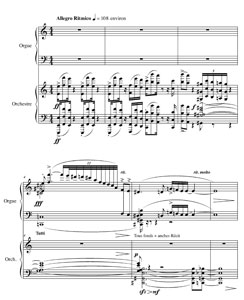 |
Excerpt No. 1 Click here to enlarge |
As if preparing the full score and parts weren’t enough, I also had to learn how to play the organ part! And that was no small task, as a fitting tribute to Marcel Dupré from her star protégée obviously would need to incorporate suitable virtuoso writing for the organ!
The cadenza that links the work’s Prélude and Fugue includes the most difficult writing, especially a passage with far-leaping double octaves for both hands. While this would be formidable enough in piano music, in organ music it is almost unheard of! This utterly baffled most every organist I showed this to: Why write that way for the organ?! Why play it as written? Why not just simplify it? Yet I knew that I had to respect the composer’s intentions, and so was determined to learn to play it exactly as written. I should here express my deep appreciation to pianist Thomas Mark of Portland, Oregon, who offered superb technical advice on how best to conquer this passage’s difficulties.
In fact, I found that my instincts were correct: Falcinelli knew exactly what she was doing in writing this seemingly outlandish gesture. In fact, I would say that she succeeded in writing what may well be the very most powerful passage of octaves for the hands in organ literature. Even though the texture is lean – two-voice counterpoint, the hands stating one voice in four octaves, against a slower pedal part in a single voice – the extraordinary management of dissonant counterpoint combined with the extraordinary power and tension created by the leaping manual octaves produces an effect of absolutely volcanic power. I would honestly say that, in a mere eight measures, Falcinelli achieved more power and drama than did Dupré in his Deuxième Esquisse, or Demessieux in her Étude VI: a true “storming the heavens” gesture of intense, focused rage.
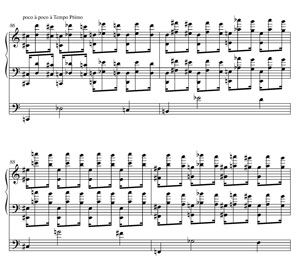 |
Excerpt No. 2 Click here to enlarge |
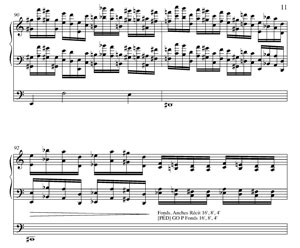 |
Excerpt No. 3 Click here to enlarge |
Yet there are so many other moments of great drama and beauty in Mausolée. In particular I think of the extended organ solo in the concluding Choral. Most of this passage is written for 8’ foundation stops, and maintains constant sustained writing in dense chords. At first glance this looks dangerous: how can a composer possibly sustain interest over such a long passage with such a monotonous color and texture? But again, Falcinelli knew exactly what she was doing: the harmony is so intense, colorful, soulful and expressive, and the voice leading and density controlled with such care and skill, that interest and expressive power are maintained perfectly throughout.
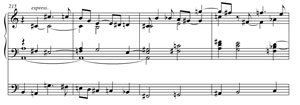 |
Excerpt No. 4 Click here to enlarge |
This passage concludes with a gradual crescendo, which bears the influence of “Jesus Falls for the First Time” from Dupré’s Stations of the Cross. As powerful as Dupré’s piece is, I am impressed that, in fewer measures, Falcinelli again achieved even more dramatic power, through the use of ingeniously-wrought dissonant voice-leading and remarkable harmonies.
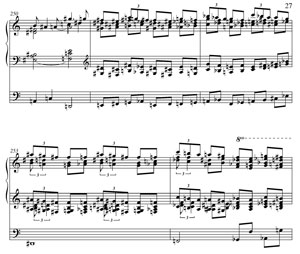 |
Excerpt No. 5 Click here to enlarge |
The end result is a deeply lyric piece, full of color, drama and emotion. It was very warmly received by the audience at its première, and I am convinced that this work deserves a place of honor in the repertoire for organ with orchestra.
I read the following program note before the performance:
« On May 13, 1971, Rolande Falcinelli performed a special concert in honor of Marcel Dupré, on the organ at Saint-Sulpice, the church where Dupré had been organist since 1934. Then on May 30, Pentecost Sunday, Dupré traveled from his home in Meudon to his church in Paris, played the morning services, returned home, told his wife that he wasn't feeling well and wanted to rest. Hours later, he died. Though he was 85 years old, his death was unexpected, and sudden.
Dupré was not just an organ instructor to Falcinelli, but a true mentor, as Falcinelli was universally considered to be the most accomplished and faithful bearer of the Dupré performance tradition.
The "tombeau" (Literally "tomb") is a time-honored French musical genre, a funerary tribute, especially to a musical colleague. Froberger and Forqueray wrote notable examples in the 17th century, Duruflé and Messiaen
in the 20th. We may infer something of the depth of Falcinelli's loss in seeing that she was not content to compose a mere "tomb" of a page or two as a tribute to her mentor. Rather, she was compelled to build a entire
"mausoleum," a concerto for organ and orchestra of some 22 minutes duration, a musical architectural statement on a truly symphonic scale.
The work is a tribute to Dupré in many ways: though a continuous, single-movement work, it falls into three sections: Prélude, Fugue and Choral - a symphonic triptych, a form that Dupré favored for improvisation. It also pays tribute to Dupré in incorporating daring virtuoso passages for the organ, especially in the dramatic cadenza that links the Prélude and Fugue.
And yet, this piece also clearly represents Falcinelli's own personal response to her mentor's death, the expression of her own profound grief.
To fit with this evening's themes of poetry and music, I will now read a poem that I find partakes of much of the same spirit as Falcinelli's Mausolée: "Do Not Go Gentle," by Dylan Thomas.
[a poem to be read on the website: www.poemhunter.com/dylan-thomas/poems/ ]
A few minutes after I finished writing these program notes yesterday afternoon, I received a phone call with the news that my daughter's grandmother had just died. So for my part, I would like to dedicate my performance tonight to the memory of Dolores Friauff »
Timothy Tikker
Dexter, Michigan, USA, 29 April 2011
www.ttikker.com




